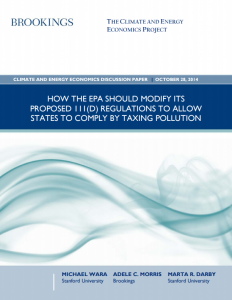Full Title: How the EPA Should Modify Its Proposed 111(d) Regulations to Allow States to Comply By Taxing Pollution
Author(s): Michael Wara, Adele Morris, and Marta R. Darby
Publisher(s): Brookings Institution
Publication Date: October 1, 2014
Full Text: Download Resource
Description (excerpt):
The U.S. Environmental Protection Agency (EPA) is exercising its authority under section 111(d) of the Clean Air Act to limit U.S. greenhouse gas (GHG) emissions from existing stationary sources, beginning with carbon dioxide (CO2) emissions from fossil-fuel fired electric generating units (EGUs, power plants, or covered sources) [1]. This comment examines the extent to which EPA’s proposed rule for existing power plants (the EPA proposal) and its existing regulations would allow states to comply with their obligations under 111(d) by adopting and enforcing carbon excise taxes. We find that although states can adopt carbon taxes to comply with 111(d) rules, EPA has inadvertently restricted how states can design their policies, precluding some of the most straightforward approaches. Accordingly, we recommend amendments that would give full flexibility to states to design policies as they see fit, provided those policies are enforceable and will achieve the applicable emissions guidelines.
